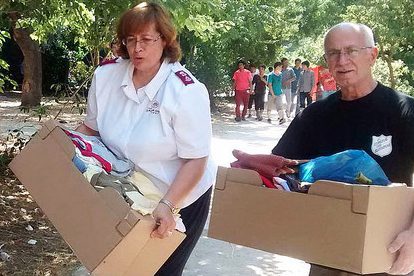
Situation called “worst refugee crisis since the Second World War.”
As European leaders seek to deal with what a European Union representative called the worst refugee crisis since the Second World War, The Salvation Army is responding across the continent, providing practical, emotional and spiritual support.
“Few who have watched news footage or read newspaper reports of the unfolding situation in Europe in recent days will have been unmoved by the plight of refugees,” said General André Cox. “Our hearts are broken, and we must act. The Salvation Army is responding to needs right across Europe, but every Salvationist can pray, and we have confidence that God hears us [1 John 5:14].”
According to the International Organization for Migration, more than 360,000 refugees and migrants have crossed the Mediterranean Sea in the first eight months of 2015—already 140,000 more than in 2014. Around 245,000 people have landed in Greece and a further 116,000 in Italy. Records show that more than 2,700 refugees have died trying to reach Europe.
The Salvation Army in Europe believes it has an ethical and humanitarian responsibility to provide support to individuals and families fleeing their countries of origin. Some activities and programs for refugees are already well established but in recent months The Salvation Army has stepped up its support and also started new activities in several European countries.
In Greece, The Salvation Army is working at the port of Piraeus in Athens to provide food and non-food items to refugees from Syria and north African countries arriving via the islands of Kos, Lesbos and others. Plans are underway to scale up support and to provide additional support in Thessaloniki.
A Salvation Army center in Rome has hosted 21 Eritrean asylum seekers since May this year, providing accommodation and food along with legal support in the process of gaining refugee status. Conversations are currently taking place with local authorities in Salerno about hosting 50 to 60 people there.
The Salvation Army in France is providing space for 275 migrants in various centers and is offering meals to 60-80 migrants in Marseille.
In The Netherlands, The Salvation Army has doubled its capacity for hosting refugees from 75 to 150 beds, with additional beds in crisis centers for the most marginalized. Refugees living in other shelters are being provided with clothing.
For many years The Salvation Army in Jönköping, Sweden, has been running a hostel for unaccompanied minors. This year it has increased capacity from 23 to 26 and is providing support through the asylum process. In addition, seven minors who have already gained asylum are being supported as they work toward independence. Two additional properties are currently being prepared to house young migrants.
In Copenhagen, Denmark, The Salvation Army provides 20 beds for migrants.
The Salvation Army in Switzerland is currently hosting 2,500 people arriving from war-torn regions. Other support includes the provision of food, healthcare, childcare, assistance with access to education, language courses and support in finding job opportunities.
In Hungary, The Salvation Army is handing out clothes, shoes, hygiene articles, sleeping bags, blankets, water and food to refugees who have gathered at rail stations.
Although Romania has not seen a huge increase in refugees over recent days, Salvation Army team members report that several migrants have needed assistance through ongoing homeless support, especially during colder weather.
The Salvation Army in the U.K. is currently preparing spaces for up to 40 refugees in one of its properties and is prepared to commit further personnel, funds and property to assist in the continuing crisis.
In Russia, The Salvation Army is providing asylum seekers with blankets, food and clothing.
In several places in Finland, The Salvation Army has started communications with the Red Cross and other organizations who are running reception centers for asylum seekers to discuss possible coordination and support.
In several centers in Germany, The Salvation Army is working together with other organizations and local authorities to provide shelter and other support, including language lessons and clothing.
As the refugee situation in Europe unfolds, The Salvation Army will continue to fulfill its mission to “meet human needs in Jesus’ name without discrimination,” offering support to people at railway stations, refugee centers and at its hundreds of churches across the continent.
More information including an interactive map is online, and donations to the Europe Disaster Fund may also be made online.












